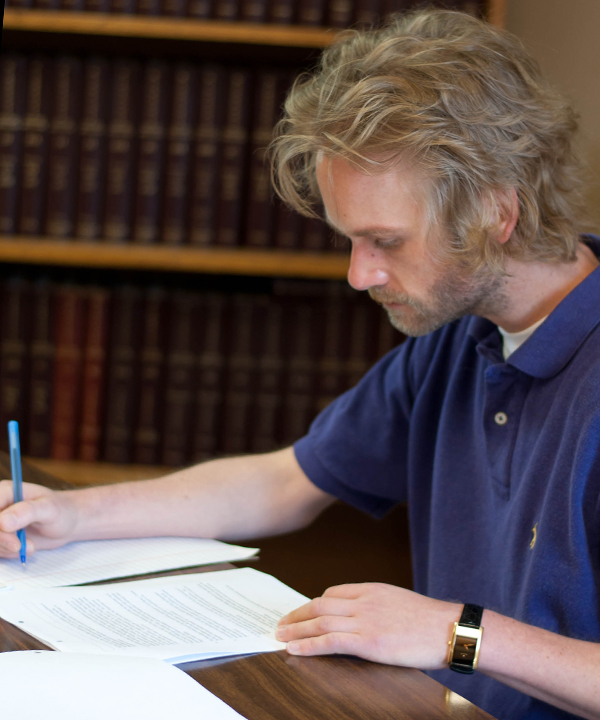Cody Nelson builds a career of giving
By Sarah Certa ’10
Cody Nelson ’02 transferred to Winona State University from the University of Wisconsin-Madison in 1999, with hopes of becoming a teacher. Yet he found the education courses weren’t a “right fit” for him, and instead decided to pursue his long-time love of history, a decision that turned out to be one of the best he’s ever made.
“My history courses at WSU were eye-opening,” says Nelson, especially those on American history, which sparked his interest in U.S. tribal relations and social justice. After taking a sociology class and learning about present-day conditions on Indian reservations, Nelson “decided to be an advocate for native peoples in the country.”
Since then Nelson has devoted his time and energy to that goal, building a remarkable career out of his passion for improving the lives of others. After graduating in 2002 with a bachelor’s in history, Nelson pursued his law degree at the University of St. Thomas. During law school he spent a lot of time volunteering at places like the Family Justice Center in Minneapolis. He knew that job openings in his desired field would be scarce and wanted to gain as much experience as he could. “I always have to give it my all,” says Nelson, “because if things don’t work out at least it’s not because I didn’t do my best.”
Nelson graduated from law school magna cum laude in 2006. Shortly after, he became a staff attorney with Anishinabe Legal Services, a non-profit organization that provides free legal services and court representation to low-income Native Americans residing on or near the White Earth, Leech Lake, and Red Lake Reservations in northern Minnesota. At the start Nelson mostly worked in juvenile representation and with victims of domestic abuse, and has since taken on a variety of matters and responsibilities, including public defender of the Leech Lake Tribal Court in 2008.
Always curious and self-motivated, Nelson wanted to know more about the administrative side of a non-profit organization and offered to help the Bi-Community Action Programs, Inc., board of directors with administrative services. Working in administration was “an incredible learning experience,” says Nelson, and he was soon appointed to a position on the Bi-Cap board. Nelson’s was promoted to supervising attorney of ALS in 2011, and, based on his administrative experience with Bi-Cap, to ALS co-executive director in December 2012. His dual positions yield both immense responsibilities and priceless rewards.
As supervising attorney and co-executive director, Nelson balances both case and administrative work, including court representation, grant writing, and restorative justice programs such as Bamenim Anishinaabeg, which works to reduce incidents of drug and alcohol abuse, gangs and violence, truancy, and unsupervised juveniles.
Bamenim Anishinaabeg was established by the Leech Lake Band of Ojibwe and brings together tribal and state jurisdictions, providing system-involved youth and their families with a court-supervised alternative that emphasizes culturally appropriate restorative justice practices. “I’ve seen some of the most amazing turnarounds,” says Nelson, “And it’s just so inspiring, to see the difference you can make.”
Nelson recalls one client in her teens who was receiving poor grades and on the verge of expulsion for poor behavior. She was raised by her grandmother, whose diabetes was worsening and required lots of care, and the teen often missed school due to stress and fatigue. Under the Bamenim Anishinaabeg program, the teen was able to receive a case manager, a mental health worker, and a personal care attendant for her grandmother. She was given the responsibility of hall-monitor at school, and within a year and a half of starting the program she was receiving A’s and B’s, was hired as a part-time custodian by the school, received her driver’s license, and made plans to further her education.
It’s stories like these that make all the hard work worthwhile. With a 55-70 hour workweek, one might expect Nelson to be rundown. His workload requires “a lot of organization and focus,” and the poverty he witnesses can take an emotional toll, yet Nelson remains optimistic and energized. “You just think about the progress you’ve made. There are so many things to be optimistic about, and proud of,” he says. “I hop out of bed at 4:30 a.m. every day because I’m excited to get to the office.”
Nelson notes that, despite the challenges faced by people living on reservations, humor and celebration play important roles in Ojibwe culture. “I’ve never been in and around a community so filled with great humor, and that takes so much time and effort to celebrate with others. From feasts, to pow-wows, community gatherings, listening sessions, and so much more. Even amidst hardship and difficult conditions, there is a very strong emphasis on humor and celebration.”
Nelson is also motivated by his co-workers, whom he describes as his heroes. “We dream big but also have opportunities to make those dreams into reality, because everyone is so passionate and dedicated. It fuels me.”
Currently Nelson and his team at ALS are working on securing funding for future programs, including a peer court program that would teach kids about court advocacy and license them to practice under an attorney in tribal court, giving kids an opportunity to learn about legal practices and gain first-hand experience in court matters.
Through his dedication and compassion, Nelson has impacted many lives and will no doubt continue to do so. While he may not have pursued a career as a teacher, Nelson is someone to learn from. He says working with the Ojibwe has taught him valuable lessons about the importance of family, community and collaboration.
“I’ve come to learn that all of humanity is interconnected, despite our individual and collective differences,” Nelson says. “The more loving, caring and supportive people you have within your network, and the more you can foster these relationships, the more satisfied and fulfilled you will be, and the more you will be able to help others.”


